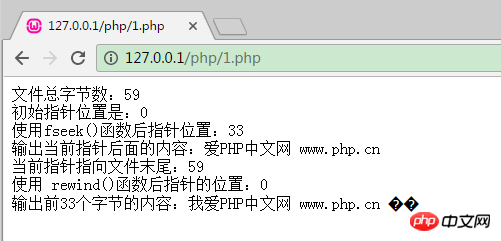
Advanced application of PHP file processing - file pointer
PHP can realize the positioning and query of the file pointer, thereby realizing the rapid query of the required information, file Pointer functions include rewind(), fseek(), feof() and ftell() functions.
In the previous article "Advanced Application of PHP File Processing—Remote File Access and Locking Files" we introduced the remote access of files and how to lock files. I didn’t read it. Friends, you can go and take a look. I won’t go into details here. Today we mainly talk about the functions in the file pointer!
1: rewind() function
This function sets the pointer of the file handle to the beginning of the file stream. The syntax format of this function is as follows :
bool rewind ( resource $handle )
Note:
If the file is opened with append ("a") mode, then any Data will always be appended to the end of the existing content of the file, no matter where the file pointer is!
2: fseek() function
The fseek() function implements the positioning of the file pointer. The syntax format of this function is as follows:
int fseek ( resource $handle , int $offset [, int $whence = SEEK_SET ] )
The handle parameter is the file to be opened.
offset is the pointer position or the offset relative to the whence parameter, which can be a negative value.
The value of whence includes the following three types:
1. SEEK_SET, the position is equal to offset bytes.
2. SEEK_CUR, the position is equal to the current position plus offset bytes.
3. SEEK_END, the position is equal to the end of the file plus offset bytes.
If the whence parameter is omitted, the system defaults to SEEK_SET.
3: feof() function
This function determines whether the file pointer is at the end of the file. The function syntax is as follows:
bool feof ( resource $handle )
If the pointer reaches the end of the file, return true, otherwise return false.
Four: ftell() function
ftell() function returns the position of the current pointer. The syntax format of this function is as follows:
int ftell ( resource $handle )
The following is to use the above four pointer functions to output the contents of the file. The sample code is as follows:
<?php
header("Content-Type:text/html; charset=utf-8");
$filename = "tm.txt"; //指定文件路径及文件名
if(is_file($filename)){ //判断文件是否存在
echo "文件总字节数:".filesize($filename)."<br>"; //输出总字节数
$fopen = fopen($filename,"rb"); // 打开文件
echo "初始指针位置是:".ftell($fopen)."<br>"; //输出指针位置
fseek($fopen,33); //制动指针
echo "使用fseek()函数后指针位置:".ftell($fopen)."<br>"; //输出制动后的指针位置
echo "输出当前指针后面的内容:".fgets($fopen)."<br>"; //输出从当前指针到行尾的内容
if (feof($fopen)){ //判断指针是否指向文件末尾
echo "当前指针指向文件末尾:".ftell($fopen)."<br>"; //如果指向了文件尾,则输出指针位置
rewind($fopen); //使用rewind()函数
echo "使用 rewind()函数后指针的位置:".ftell($fopen)."<br>"; //查看使用rewind()函数后指针的位置
echo "输出前33个字节的内容:".fgets($fopen,33); //输出前33个字节的内容
fclose($fopen); //关闭文件
}else{
echo "文件不存在";
}
}
?>The output result is:

PHP The introduction of advanced applications of file processing is over here. Next, we will introduce PHP file upload. For details, please read "php file upload—Configuring the php.inn file and predefined variables $_FILES"!
The above is the detailed content of Advanced application of PHP file processing—file pointer. For more information, please follow other related articles on the PHP Chinese website!




